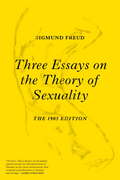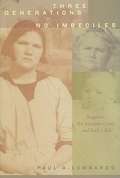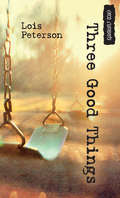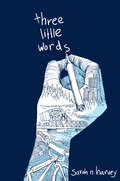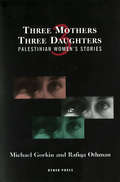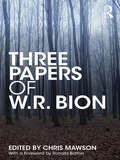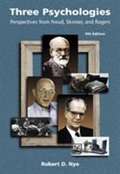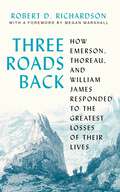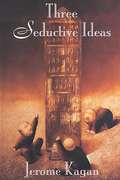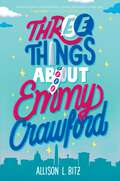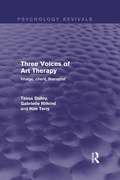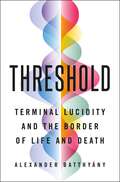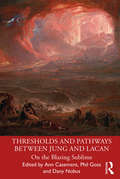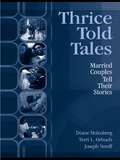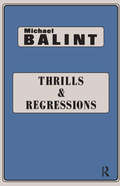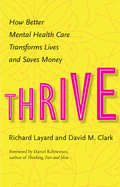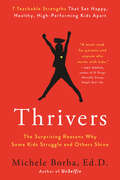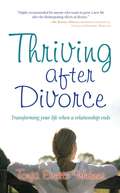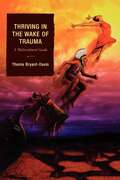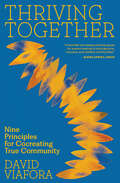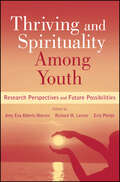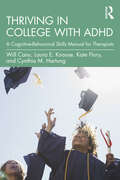- Table View
- List View
Three Dreamers: A Memoir of Family
by Lorenzo CarcaterraThe #1 New York Times bestselling author of Sleepers offers a heartfelt homage to the women who taught him courage, kindness, and the power of storytelling: his mother, his grandmother, and his late wife.&“This deeply personal memoir weaves beauty, hilarity, and loss into a glorious tapestry.&”—Adriana Trigiani, New York Times bestselling author of Tony's Wife At sixty-six, Lorenzo Carcaterra finds it easier to reflect on the past than ruminate on the future. &“By the time you reach my age,&” he writes, &“you have witnessed too much loss to not be aware of what lies ahead.&” This turn to the past inspired a poignant memoir about the women who made him the man he is today.His Italian grandmother, Nonna Maria, gave him his first taste of a loving home during the summers he spent with her as a teenager on Ischia, an island off the coast of Naples. With her kindness, her humor, and the same formidable strength she employed to make secret trips for food when the Nazis occupied Ischia during World War II, she instilled in him the importance of community, providing shelter for a boy whose home life was difficult.His mother, Raffaela, dealt with daily hardships: a loveless and abusive marriage, the burden of debt, and a life of dread. Though the lessons she taught were harsh, they would drive Lorenzo from the world they shared to the better one she always prayed he would find.The third woman is his wife, Susan, a gifted editor and his professional champion. Their marriage lasted three decades before her death from lung cancer in 2013. While their upbringings were wildly different, their love and friendship never wavered—and neither did her faith in Lorenzo&’s talent and potential as a writer.Standing with his children near Nonna Maria&’s grave on a recent trip to Ischia, Lorenzo realized how much of his life has been shaped by the women who taught him how to look for joy and overcome sorrow. This book is his tribute to them.
Three Essays on the Theory of Sexuality
by Sigmund Freud James StracheyThree Essays on the Theory of Sexuality: Sexual Abberations Infantile Sexuality Transformations of Puberty
Three Essays on the Theory of Sexuality: The 1905 Edition
by Sigmund Freud Herman Westerink Phillippe Van Haute Ulrike KistnerThe first edition of this classic work from 1905 shows a radically different psychoanalysisThe traditional story about the historical origins of Freudian psychoanalysis implies that the Oedipus complex was part of Freudian theory from the very beginning. However, in this first edition of Three Essays on Sexuality, first published in 1905 and never before translated into English, we find no reference whatsoever to the Oedipus complex. Is there a Freudian psychoanalysis that is not Oedipal?This first version of Freud’s Three Essays articulates just such a non-Oedipal psychoanalysis. As such, it still has a definite ‘emancipatory’ potential; Freudian psychoanalysis is not Oedipal in its very nature. It is only from 1909 onwards that psychoanalysis tends to become a sophisticated defence of what Freud first called the ‘popular opinion’ about sexuality. It was precisely this ‘popular opinion’ that psychoanalysis originally was meant to deconstruct. Is there a Freudian escape – that is an escape that remains not so much within Freudian orthodoxy, but at least within its inspiration – from this impasse?If Freud has respected more systematically his own original thesis, could it be that the Oedipus complex wouldn’t be the shibboleth of psychoanalysis? Not only is this first edition less Oedipal than is generally believed, but it also contains the elements for thinking a ‘non-Oedipal’ psychoanalysis; a Freud against Oedipus.Introduction by Philippe Van HauteFrom the Trade Paperback edition.
Three Generations, No Imbeciles: Eugenics, the Supreme Court, and Buck v. Bell
by Paul A. Lombardo"Three generations of imbeciles are enough." Few lines from Supreme Court opinions are as memorable as this declaration by Justice Oliver Wendell Holmes Jr. in the landmark 1927 case Buck v. Bell. The ruling allowed states to forcibly sterilize residents in order to prevent "feebleminded and socially inadequate" people from having children. It is the only time the Supreme Court endorsed surgery as a tool of government policy. Paul Lombardo's startling narrative exposes the Buck case's fraudulent roots. In 1924 Carrie Buck -- involuntarily institutionalized by the State of Virginia after she was raped and impregnated -- challenged the state's plan to sterilize her. Having already judged her mother and daughter mentally deficient, Virginia wanted to make Buck the first person sterilized under a new law designed to prevent hereditarily "defective" people from reproducing. Lombardo's more than twenty-five years of research and his own interview with Buck before she died demonstrate conclusively that she was destined to lose the case before it had even begun. Neither Carrie Buck nor her mother and daughter were the "imbeciles" condemned in the Holmes opinion. Her lawyer -- a founder of the institution where she was held -- never challenged Virginia's arguments and called no witnesses on Buck's behalf. And judges who heard her case, from state courts up to the U.S. Supreme Court, sympathized with the eugenics movement. Virginia had Carrie Buck sterilized shortly after the 1927 decision. Though Buck set the stage for more than sixty thousand involuntary sterilizations in the United States and was cited at the Nuremberg trials in defense of Nazi sterilization experiments, it has never been overturned. Three Generations, No Imbeciles tracks the notorious case through its history, revealing that it remains a potent symbol of government control of reproduction and a troubling precedent for the human genome era.
Three Good Things (Orca Currents)
by Lois PetersonLeni has lived in so many different places in the last few years that she’s not surprised when her mom wakes her in the middle of the night and tells her to pack up her things. The reason for this move? Her mom tells her they have won the lottery, and they have to go underground. Leni is still not surprised when they end up in a filthy motel. But when Leni makes a new friend and tries to explain their lifestyle, she begins to understand just how messed up her life has become. This short novel is a high-interest, low-reading level book for middle-grade readers who are building reading skills, want a quick read or say they don’t like to read! The epub edition of this title is fully accessible.
Three Little Words
by Sarah N. HarveySixteen-year-old Sid barely remembers his birth mother and has no idea who his father was. Raised on an idyllic island by loving foster parents, Sid would be content to stay there forever, drawing, riding his bike, hanging out with his friend Chloe and helping out with Fariza, a newly arrived foster child. But when a stranger named Phil arrives on the island with disturbing news about his birth family—including a troubled younger brother—Sid leaves all that is familiar to help find the sibling he didn't know existed. What he discovers is a family fractured by mental illness, but also united by strong bonds of love and compassion. As Sid searches for his brother, gets to know his grandmother, and worries about meeting his biological mother, he realizes that there will never be a simple answer to the question, Am I my brother's keeper?
Three Mothers, Three Daughters: Palentian Women Studies (Cultural Studies)
by Michael GorkinA collaboration between an Israeli psychologist and a Palestinian school teacher.This highly original book recounts the surprisingly candid stories of three Palestinian mothers and their daughters. Beautifully told and sensitively edited, these linked narratives bear witness to their experiences of Israeli occupation, their memories of the wars of 1948 and 1967, and the profound changes that have occurred in their political and personal lives. "The complexity of the women's lives and stories and the ways in which they portray themselves in the book make this work of value to anthropologists, as well as to scholars in women's studies, oral history, Middle East studies, and sociology."-Journal of Palestine Studies
Three Papers of W.R. Bion
by W.R. BionThree Papers of W.R. Bion features two previously unpublished papers and one which has only previously appeared in The Complete Works of W. R. Bion (2014). Characterised by Bion’s directness, clarity and intensity, together they illustrate important aspects of his later thinking. They also show Bion using his key ideas in fresh contexts which will allow readers already familiar with his theoretical and clinical concepts to appreciate them from a new angle. The first paper, Memory and Desire, clarifies one of Bion’s most important and clinically-relevant ideas: the value of suspending elements of our memory and desire in the service of allowing openness to psychoanalytic intuition. The second, Negative Capability, was reformulated to become the final chapter of his 1970 Attention and Interpretation. The publication here of the original paper allows an interesting and rewarding three-way comparison to be made with the 1970 chapter, and Memory and Desire. The third paper, Break Up, Break Down, Break Through, was presented without notes in 1976 in Los Angeles and the transcript from the recorded talk is published here for the first time. It displays the complex interweaving of the personal and the theoretical and offers a fascinating contribution to the study of what Bion called "the turbulence that obeys no man-made ‘laws of nature’". Wilfred R. Bion’s writing continues to be read and re-read by an increasing and widening readership; the three papers presented here possess contemporary clinical relevance and each have a bearing on the underlying philosophical basis of psychoanalytical work and thinking.
Three Psychologies: Perspectives From Freud, Skinner, and Rogers (Sixth Edition)
by Robert D. NyeRobert D. Nye's THREE PSYCHOLOGIES clearly and succinctly presents the essential ideas of Freud, Skinner, and Rogers, three of the most important contributors to contemporary psychological thought. A brief introductory chapter gives an overview of each perspective and points out some basic differences among the theories. Chapters Two, Three, and Four discuss the basic ideas of the three psychologists, including practical examples, real-world applications, and commentaries. Chapter Five compares the theories on specific topics, also offering critical evaluations, and Nye's personal comments. An Epilogue includes concise information about cognitive psychology and Albert Ellis's rational-emotive behavior therapy, so that readers can compare these currently popular approaches with those of Freud, Skinner, and Rogers.
Three Roads Back: How Emerson, Thoreau, and William James Responded to the Greatest Losses of Their Lives
by Robert D. RichardsonFrom their acclaimed biographer, a final, powerful book about how Emerson, Thoreau, and William James forged resilience from devastating loss, changing the course of American thoughtIn Three Roads Back, Robert Richardson, the author of magisterial biographies of Ralph Waldo Emerson, Henry David Thoreau, and William James, tells the connected stories of how these foundational American writers and thinkers dealt with personal tragedies early in their careers. For Emerson, it was the death of his young wife and, eleven years later, his five-year-old son; for Thoreau, it was the death of his brother; and for James, it was the death of his beloved cousin Minnie Temple. Filled with rich biographical detail and unforgettable passages from the journals and letters of Emerson, Thoreau, and James, these vivid and moving stories of loss and hard-fought resilience show how the writers’ responses to these deaths helped spur them on to their greatest work, influencing the birth and course of American literature and philosophy.In reaction to his traumatic loss, Emerson lost his Unitarian faith and found solace in nature. Thoreau, too, leaned on nature and its regenerative power, discovering that “death is the law of new life,” an insight that would find expression in Walden. And James, following a period of panic and despair, experienced a redemptive conversion and new ideas that would drive his work as a psychologist and philosopher. As Richardson shows, all three emerged from their grief with a new way of seeing, one shaped by a belief in what Emerson called “the deep remedial force that underlies all facts.”An inspiring book about resilience and the new growth and creativity that can stem from devastating loss, Three Roads Back is also an extraordinary account of the hidden wellsprings of American thought.
Three Seductive Ideas
by Jerome KaganDo the first two years of life really determine a child's future development? Are human beings, like other primates, only motivated by pleasure? And do people actually have stable traits, like intelligence, fear, anxiety, and temperament? This book, the product of a lifetime of research by one of the founders of developmental psychology, takes on the powerful assumptions behind these questions--and proves them mistaken. Ranging with impressive ease from cultural history to philosophy to psychological research literature, Jerome Kagan weaves an argument that will rock the social sciences and the foundations of public policy. Scientists, as well as lay people, tend to think of abstract processes--like intelligence or fear--as measurable entities, of which someone might have more or less. This approach, in Kagan's analysis, shows a blindness to the power of context and to the great variability within any individual subject to different emotions and circumstances. "Infant determinism" is another widespread and dearly held conviction that Kagan contests. This theory--with its claim that early relationships determine lifelong patterns--underestimates human resiliency and adaptiveness, both emotional and cognitive (and, of course, fails to account for the happy products of miserable childhoods and vice versa). The last of Kagan's targets is the vastly overrated pleasure principle, which, he argues, can hardly make sense of unselfish behavior impelled by the desire for virtue and self-respect--the wish to do the right thing. Written in a lively style that uses fables and fairy tales, history and science to make philosophical points, this book challenges some of our most cherished notions about human nature.
Three Things About Emmy Crawford
by Allison L. BitzIn this coming-of-age novel perfect for fans of Lynn Painter and Rebecca Lynn Solomon, nothing can derail Emmy Crawford, the type-A daughter of a senator, from relentlessly pursuing her dreams—not Crohn’s disease, the paparazzi, or even heartbreak. "Emotional, sweet, and ridiculously swoony, this book is a must-read." —Lynn Painter, New York Times Bestselling Author of Better Than the MoviesThere are three things high school senior Emmy Crawford will accomplish, no matter what: Taking Nationals in debate this season.Shielding her sister, Issy, from anything that could hurt her, especially her anxiety.Representing her family well, since her mom may be the next president.And nothing can get in Emmy's way. Not Crohn’s disease, even if her gut has been acting up. Not the paparazzi, who snap any photos they can get of the daughters of a presidential candidate. And definitely not her feelings for Gabe Castillo, the only debater in DC who stands a chance at beating her—and who she used to be on secret kissing terms with, before he ghosted her. When Gabe unexpectedly returns to the debate scene and Issy starts crushing on him, Emmy works harder than ever to keep her eyes on winning and off her aching heart and body, because the alternative means losing the three things that matter most.
Three Voices of Art Therapy: Image, client, therapist (Psychology Revivals)
by Tessa Dalley Gabrielle Rifkind Kim TerryThe image, the client and the therapist are three essential aspects of the art therapy relationship; each has a separate ‘voice’. In this book, originally published in 1993, the three voices come alive as the client, Kim, and the therapist, Gabrielle, tell the story of his path from suicidal despair to health and creativity through a series of extraordinary images. The images, chosen to represent the stages of Kim’s therapeutic experience, speak for themselves and convey their importance as a powerful catalyst for change. An outer voice, that of Tessa Dalley, provides a theoretical commentary on the process as it occurs, adding to the understanding of what is happening in the therapeutic encounter. This fully rounded account of clinical practice in art therapy offers a rare insight into common issues and dilemmas which will make the book of interest to both professional and non-professional readers alike.
Three Women
by Lisa TaddeoIt thrills us and torments us. It controls our thoughts, destroys our lives, and it’s all we live for. Yet we almost never speak of it. And as a buried force in our lives, desire remains largely unexplored—until now. Over the past eight years, journalist Lisa Taddeo has driven across the country six times to embed herself with ordinary women from different regions and backgrounds. The result, Three Women, is the deepest nonfiction portrait of desire ever written and one of the most anticipated books of the year. <p><p> We begin in suburban Indiana with Lina, a homemaker and mother of two whose marriage, after a decade, has lost its passion. She passes her days cooking and cleaning for a man who refuses to kiss her on the mouth, protesting that “the sensation offends” him. To Lina’s horror, even her marriage counselor says her husband’s position is valid. Starved for affection, Lina battles daily panic attacks. When she reconnects with an old flame through social media, she embarks on an affair that quickly becomes all-consuming. <p> In North Dakota we meet Maggie, a seventeen-year-old high school student who finds a confidant in her handsome, married English teacher. By Maggie’s account, supportive nightly texts and phone calls evolve into a clandestine physical relationship, with plans to skip school on her eighteenth birthday and make love all day; instead, he breaks up with her on the morning he turns thirty. A few years later, Maggie has no degree, no career, and no dreams to live for. When she learns that this man has been named North Dakota’s Teacher of the Year, she steps forward with her story—and is met with disbelief by former schoolmates and the jury that hears her case. The trial will turn their quiet community upside down. <p> Finally, in an exclusive enclave of the Northeast, we meet Sloane—a gorgeous, successful, and refined restaurant owner—who is happily married to a man who likes to watch her have sex with other men and women. He picks out partners for her alone or for a threesome, and she ensures that everyone’s needs are satisfied. For years, Sloane has been asking herself where her husband’s desire ends and hers begins. One day, they invite a new man into their bed—but he brings a secret with him that will finally force Sloane to confront the uneven power dynamics that fuel their lifestyle. <p> Based on years of immersive reporting, and told with astonishing frankness and immediacy, Three Women is a groundbreaking portrait of erotic longing in today’s America, exposing the fragility, complexity, and inequality of female desire with unprecedented depth and emotional power. It is both a feat of journalism and a triumph of storytelling, brimming with nuance and empathy, that introduces us to three unforgettable women—and one remarkable writer—whose experiences remind us that we are not alone. <p> <b>New York Times Bestseller</b>
Threshold: Terminal Lucidity and the Border of Life and Death
by Alexander BatthyányTerminal lucidity is a relatively common but poorly understood phenomenon. Near the end of life, many people--including those who have suffered brain injuries or strokes, or have been silenced by mental illness or deep dementia--experience what seems a miraculous return. They regain their clarity and energy, are able to talk with families and caregivers, recall their lives and often appear to be aware of their nearing death.In this remarkable book, cognitive scientist and Director of the Viktor Frankl Institute Dr. Alexander Batthyány offers the first major account of terminal lucidity, utilizing hundreds of case studies and his research in the related field of near-death studies to explore the mind, the body, the nature of consciousness, and what the living can learn from those who are crossing the border from life to death.Astonishing, authoritative, and deeply moving, Threshold opens a doorway into one of life's--and death's--most provocative mysteries.
Thresholds and Pathways Between Jung and Lacan: On the Blazing Sublime
by Phil Goss Ann Casement Dany NobusThis groundbreaking book was seeded by the first-ever joint Jung–Lacan conference on the notion of the sublime held at Cambridge, England, against the backdrop of the 100th anniversary of the outbreak of the Great War. It provides a fascinating range of in-depth psychological perspectives on aspects of creativity and destruction inherent in the monstrous, awe-inspiring sublime. The chapters include some of the outcrop of academic and clinical papers given at this conference, with the addition of new contributions that explore similarities and differences between Jungian and Lacanian thinking on key topics such as language and linguistics, literature, religion, self and subject, science, mathematics and philosophy. The overall objective of this vitalizing volume is the development and dissemination of new ideas that will be of interest to practising psychoanalysts, psychotherapists and academics in the field, as well as to all those who are captivated by the still-revolutionary thinking of Jung and Lacan.
Thrice Told Tales: Married Couples Tell Their Stories
by Terri L. Orbuch Joseph Veroff Diane HolmbergResearchers have studied marriage for decades, but how is the transition to married life actually experienced by the couples involved? From an insider's perspective, Thrice Told Tales examines married couples' own stories of their relationship. A representative sample of 199 African-American and 177 White married couples were asked to tell the story of their relationship. It provides accounts of courtships, weddings, honeymoons, their adjustment in the early years, and hopes for the future. These stories were first collected a few months after their weddings, and again in the third and seventh years of their marriages. What features of their relationship do the couples highlight as central in the early years? How do their stories change over time? What can we learn about couples' marital well-being by analyzing their stories? How do the stories of men and women, and of White and African-American couples differ? These questions were systematically addressed using extensive coding schemes and comprehensive quantitative analyses. Details of the coding system and procedures are included, making this volume a useful reference for any researcher contemplating analysis of narrative data. However, the key points are also explained in simple prose and illustrated with quotes from the couples' own stories, making the book accessible to anyone with an interest in how young couples experience married life today.
Thrills and Regressions
by Michael BalintContents: Part One - Thrills; Part Two - Regressions; Part Three: Appendix; Part Four - Conclusions. This book includes the paper "Distance in Time and Space" by Enid Balint.
Thrive
by Daniel Kahneman Richard Layard David M. ClarkMental illness is a leading cause of suffering in the modern world. In sheer numbers, it afflicts at least 20 percent of people in developed countries. It reduces life expectancy as much as smoking does, accounts for nearly half of all disability claims, is behind half of all worker sick days, and affects educational achievement and income. There are effective tools for alleviating mental illness, but most sufferers remain untreated or undertreated. What should be done to change this? In Thrive, Richard Layard and David Clark argue for fresh policy approaches to how we think about and deal with mental illness, and they explore effective solutions to its miseries and injustices. Layard and Clark show that modern psychological therapies are highly effective and could potentially turn around the lives of millions of people at little or no cost. This is because treating psychological problems generates huge savings on physical health care, as well as massive economic savings through more people working. So psychological therapies would effectively pay for themselves, generating potential savings for nations the world over. Layard and Clark describe how various successful psychological treatments have been developed and explain what works best for whom. They also discuss how mental illness can be prevented through better schools and a better society, and the urgency of doing so.Illustrating why we cannot afford to ignore the issue of mental illness, Thrive opens the door to new options and possibilities for one of the most serious problems facing us today.
Thrivers: The Surprising Reasons Why Some Kids Struggle and Others Shine
by Michele BorbaThe bestselling author of UnSelfie explains why the old markers of accomplishment (grades, test scores) are no longer reliable predictors of success in the 21st century -- and offers 7 teachable traits that will safeguard our kids for the future.Michele Borba has been a teacher, educational consultant, and parent for 40 years -- and she's never been more worried than she is about this current generation of kids. The high-achieving students she talks with every day are more accomplished, better educated, and more privileged than ever before. They're also more stressed, unhappier, and struggling with anxiety, depression, and burnout at younger and younger ages -- "we're like pretty packages with nothing inside," said one young teen. Thrivers are different: they flourish in our fast-paced, digital-driven, often uncertain world. Why? Dr. Borba combed scientific studies on resilience, spoke to dozens of researchers/experts in the field and interviewed more than 100 young people from all walks of life, and she found something surprising: the difference between those who struggle and those who succeed comes down not to grades or test scores, but to seven character traits that set Thrivers apart (and set them up for happiness and greater accomplishment later in life). These traits--confidence, empathy, self-control, integrity, curiosity, perseverance, and optimism--will allow kids to roll with the punches and succeed in life. And the even better news: these traits can be taught to children at any age...in fact, parents and educations must do so. In Thrivers, Dr. Borba offers practical, actionable ways to develop these traits in children from preschool through high school, showing how to teach kids how to cope today so they can thrive tomorrow.
Thriving After Divorce
by Tonja Evetts WeimerThe end of a significant relationship initiates painful and powerful change in one's life, daily habits, and even in one's personal identity. In Thriving After Divorce, author and relationship coach Tonja Evetts Weimer offers readers a grounded approach to growing through the difficult life transitions that arise from the breaking of our most defining partnerships. Weimer's book will guide readers through a potentially tumultuous time to a safe place by showing how to put one's actions in alignment with one's needs and values for positive outcomes that will strengthen and prepare the heart for a new path. The key is in learning how to create an authentic new life, and therefore, a different relationship with the partner in the absence of shared romantic love. This relationship allows the possibility of any continuing combined goals, while building and sustaining necessary boundaries and guidelines for new interactions. Weimer shows readers how to deal with shared responsibilities involving children, mutual business interests, the care of family members, and other situations that require both parties to work together in the new space of the relationship. Thriving After Divorce speaks to anyone who has gone through a breakup, providing hope, alternatives, empowerment, and inspiration to find a new way to relate to former situations and relationships that, in the past, could have been fractious.
Thriving In The Wake Of Trauma: A Multicultural Guide
by Thema Bryant-DavisRace, ethnicity, sexual orientation, migration status, religion, and numerous other cultural factors play important roles in recovery from traumatic events. Survivors of abuse, dislocation, disease, racism and other forms of trauma, however, are often treated only as individuals rather than as people with diverse beliefs and cultural affiliations. Thema Bryant-Davis examines the cultural issues that health-care professionals need to consider in caring for trauma survivors. She gives specific examples drawn in part from her own work as a clinician, and she describes activities that can help trauma victims not only survive, but also thrive and grow.
Thriving Together: Nine Principles for Cocreating True Community
by David ViaforaSeasoned community builder David Viafora pinpoints the nine principles that create conditions for joy and solidity in any communityResearch over the last few decades reveals that our social fabric is unraveling as rates of isolation and loneliness continue to rise, climate crises intensify, and an individualistic worldview prevails. Is there another way to live? Where can we turn for guidance and hope in the face of such challenges? In this astute and empowering guide, David Viafora, a former Buddhist monk, points to community building as a fresh yet ancient and powerful way to face our most pressing individual, social, and ecological challenges. With precision, enthusiasm, and deep humility, Viafora draws from his own vast experience of mindfulness communities to offer inspiration and concrete guidance in growing thriving communities from the inside out. The nine principles Viafora uncovers for successful community—including Visioning, Service, Joy, and Reconciliation—are broad and easily applicable to our existing groups and relationships. Yet their potential to reshape the most basic elements of our life and friendships is revolutionary. With these nine principles in hand, we can cocreate another way of being—beyond isolation, individualism, and despair. In true community, we don&’t have to face the difficulties of the world on our own. What we can embrace and heal as a community is far greater and more fulfilling than what we could ever achieve alone. Whether your aim is to start a new group, strengthen the community you already belong to, or explore what mindful community living has to offer, Thriving Together teaches us how to:• Collectively create a vision to guide your community&’s unique growth and purpose• Strengthen the culture of joy, appreciation, and peace in your family or community• Nurture vibrant, compassionate friendships as the foundation of community life• Strengthen the muscles of reconciliation through simple yet powerful communication practices• Embark upon meaningful service projects that nourish and heal both your community and others• Protect your community by creating healthy boundaries in relationship to power dynamics• Embrace racial healing as a path of compassionate and inclusive community building
Thriving and Spirituality Among Youth
by Richard M. Lerner Amy Eva Warren Erin PhelpsThriving and Spirituality Among Youth empirically explores the connections between spirituality and positive youth development through the research of a set of scholars from the wide array of scientific fields including biology, sociology, and theology. This unique handbook shows how to foster positive development during adolescence, including youth contributions to families and communities in civil society. The material draws on research conducted with various populations including immigrant Hispanic, Chinese, Israeli, and Muslim-American youth. Social workers and mental health professionals will find a new, developmentally rigorous data base for a science of "adolescent spirituality."
Thriving in College with ADHD: A Cognitive-Behavioral Skills Manual for Therapists
by Laura E. Knouse Will Canu Kate Flory Cynthia M. HartungThriving in College with ADHD uses cognitive-behavioral and psychoeducational techniques to address ADHD and related impairment in a way that is tailored to the needs of college students. This manual distills the expertise of four psychologists with extensive experience helping students with ADHD. The treatment is designed to be effective, flexible, and feasible. Modules address organization, time management, planning, and academic skills, adaptive thinking, healthy lifestyles, relationships, and other life skills. They can be used with individuals or groups and as an abbreviated or comprehensive treatment, tailored to client needs. The accompanying student workbook will increase the treatment’s impact and keep college students engaged in learning new skills. Any mental health professional working with college students with ADHD can benefit their clients by adding this approach to their toolbox.


